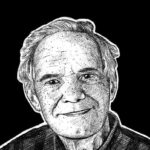David Premack biography and theory

David Premack (October 26, 1925 – June 11, 2015) was an American psychologist and professor at the University of Pennsylvania, United States. His contributions to the field of psychology have increased human understanding and knowledge about cognition and behavior. David Premack studied experimental psychology at the University of Minnesota and began studying primates, primarily chimpanzees, in the 1950s. The focus of these studies has been on behavioral reinforcement and cognition, and his studies have had a major impact on psychology and education.
The biography of David Premack
David Premack was born in Aberdeen, South Dakota. His father was Leonard B. Premack and his mother was Sonja Liese Premack.
He received his BA in chemistry from the University of Minnesota, a liberal arts degree and an MA in experimental psychology and philosophy. He also served in the United States Army during World War I, from 1943 to 1946.
Before starting as a psychology professor in 1975, Premack held appointments at the University of Minnesota, the University of Missouri, the University of California and Harvard University. He also established a study center in Honey Brook, Pennsylvania.
Pshychology theory / theory of mind
During the period that David made a career in psychology, a great revolution took place in the discipline.
He made an important contribution to dominant behaviorism with his Premack Principle. The Premack Principle states that certain behavior can serve as a reinforcer for other behavior.
Midway through his career, he embraced the cognitive revolution by embracing it and applying some of his ideas and experiments. The behaviorists believed that humans were just complicated animals, but that there was little difference between the two.
David Premack showed that chimpanzees are very advanced cognitively. More than previously believed. He showed that the animals could understand and produce conceptual relationships using symbols and language.

The theory of mind deals with the human intrinsic understanding of one’s own, as well as the mental state of others. He found evidence for this among chimpanzees.
He also emphasized some uniquely human characteristics, such as the syntax of language and intentional teaching as an activity.
David Premack is unique in psychology through his combination of theoretical and empirical excellence. Also, it is not often that a researcher’s contribution consists of two strongly opposing views within psychology.
In 1990, David Premack retired and he moved to France. Here he and his wife Ann studied the cognition of young children. Finally, the two returned to Santa Barbara. In 2005, David Premack was designated a William James Fellow of the American Psychology Society.
David Premack died on June 11, 2015. He was 89 years old. He left behind his wife Ann M. James and three children Timothy, Ben and Lisa.
Publications, books and articles
- 2018. On the abstractness of human concepts: Why it would be difficult to talk to a pigeon. In Cognitive processes in animal behavior (pp. 423-451). Routledge.
- 2017. Mechanisms of self-control. In Learning mechanisms in smoking (pp. 107-123). Routledge.
- 2012. Do infants have a sense of fairness?. Psychological science, 23(2), 196-204.
- 2010. Why humans are unique: Three theories. Perspectives on Psychological Science, 5(1), 22-32.
- 2007. Human and animal cognition: Continuity and discontinuity. Proceedings of the national academy of sciences, 104(35), 13861-13867.
- 2004. Is language the key to human intelligence?. Science, 303(5656), 318-320.
- 1998. Why animals lack pedagogy and some cultures have more of it than others. The handbook of education and human development: New models of learning, teaching and schooling, 291-310.
- 1997. Infants attribute value±to the goal-directed actions of self-propelled objects. Journal of cognitive neuroscience, 9(6), 848-856.
- 1995. Origins of human social competence.
- 1994. Levels of causal understanding in chimpanzees and children. Cognition, 50(1-3), 347-362.
- 1990. The infant’s theory of self-propelled objects. Cognition, 36(1), 1-16.
- 1989. The perception of intention. Science, 243(4889), 365-367.
- 1988. Spontaneous transfer of matching by infant chimpanzees (Pan troglodytes). Journal of Experimental Psychology: Animal Behavior Processes, 14(2), 140.
- 1985. “Gavagai!” or the future history of the animal language controversy. Cognition, 19(3), 207-296.
- 1983. Animal cognition. Annual review of psychology.
- 1983. The codes of man and beasts. Behavioral and Brain Sciences, 6(1), 125-136.
- 1981. Reasoning in the chimpanzee: I. Analogical reasoning. Journal of Experimental Psychology: Animal Behavior Processes, 7(1), 1.
- 1981. Primative mathematical concepts in the chimpanzee: proportionality and numerosity. Nature, 293(5833), 568-570.
- 1979. Intentional communication in the chimpanzee: The development of deception. Cognition, 7(4), 333-362.
- 1979. Children’s comprehension and memory for stories. Journal of experimental child psychology, 28(3), 379-403.
- 1978. Chimpanzee problem-solving: a test for comprehension. Science, 202(4367), 532-535.
- 1978. Does the chimpanzee have a theory of mind?. Behavioral and brain sciences, 1(4), 515-526.
- 1972. Teaching language to an ape. Scientific American, 227(4), 92-99.
- 1971. Language in chimpanzee?. Science, 172(3985), 808-822.
- 1962. Reversibility of the reinforcement relation. Science, 136(3512), 255-257.
- 1959. Toward empirical behavior laws: I. Positive reinforcement. Psychological review, 66(4), 219.
How to cite this article:
Janse, B. (2022). David Premack. Retrieved [insert date] from Toolshero: https://www.toolshero.com/toolsheroes/david-premack/
Original publication date: 06/20/2022 | Last update: 08/21/2023
Add a link to this page on your website:
<a href=”https://www.toolshero.com/toolsheroes/david-premack/”>Toolshero: David Premack</a>











